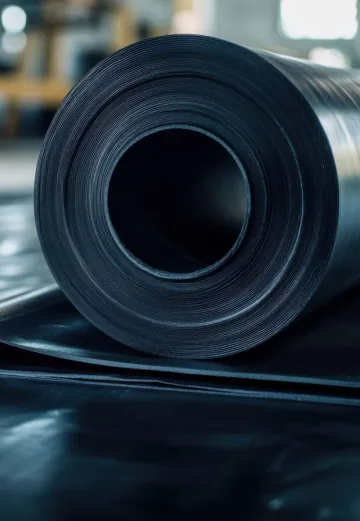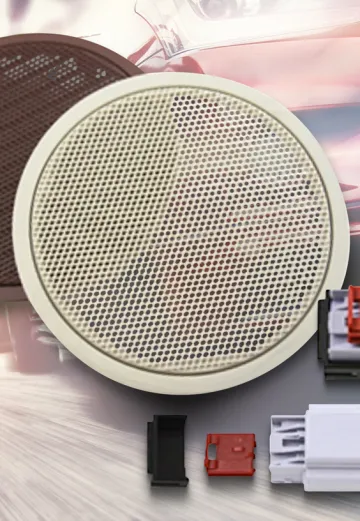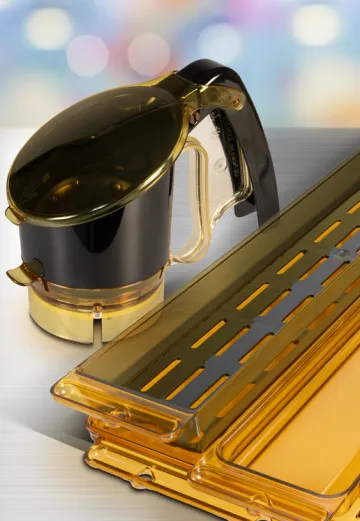The global demand for high-performance engineering plastics continues to rise, largely because of their remarkable mechanical properties and resistance to a broad range of harsh conditions. COVID-19 has contributed to the use of these materials – most likely because of the increased frequency with which harsh and sometimes corrosive cleaning solutions are being used in the disinfection process.
Generally speaking, engineering plastics are superior to commodity plastics such as polypropylene (PP), polyethylene (PE), polystyrene (PS), acrylonitrile butadiene styrene (ABS), acrylic (PMMA) and polyvinyl chloride (PVC). Engineering plastics include polyethylene terephthalate (PET), polytherimide (PEI), polyamide (Nylon) and polyether ketone (PEEK), among many others.
Engineering plastics offer excellent heat resistance, mechanical strength, chemical resistance, dimensional stability and wear resistance. They can also be used continuously at temperatures between 100°C and 150°C. Accordingly, these materials are also referred to as technical thermoplastics. Working with these plastics requires a much higher degree of experience and expertise, so choosing the right vendor to work with is critical to the success of your project. But how do you know which material is right for your project? The key to a successful project is finding an injection molding partner with extensive hands-on experience and a deep knowledge into how these materials perform in a variety of settings.
In comparison with metals, thermoplastics may offer such advantages as transparency, self-lubrication, economy in fabricating and decorating. Highly flexible and strong, engineering plastics can serve as electrical nonconductors and thermo insulators. The properties of these materials can also be modified through the use of reinforcing agents, fillers and chemical additives. Engineering applications include mechanical units under stress, low friction components, heat and chemical resistant units, electrical parts, housings, high light transmission applications, building construction functions, just to name a few.
The beneficial properties of engineering plastics include:
Long-term Heat Resistance: Engineering plastics maintain their physical and mechanical properties at temperatures up to 400° F. Injection-molded parts and components made from these high-grade materials maintain their precise dimensions even after steam autoclave sterilization or thousands of hours of immersion in boiling water. This incredible resistance to repeated sterilization and disinfection make engineering plastics an ideal choice for medical devices.
Superior Strength and Dimensional Stability: With superior dimensional stability, technical thermoplastics are predictable and reliable over a wide range of temperatures. They consistently maintain their strength and stiffness when used continuously in high-heat environments up to 400°F.
Chemical Resistance: Most parts and components made with thermoplastic resins will retain their strength and resist stress cracking when exposed to fats and oils, automotive and aircraft fluids, aliphatic hydrocarbons, alcohols, mineral acids, halogenated solvents, ultraviolet rays and gamma radiation.
Flame Resistance: Even without the inclusion of additives, most grades of thermoplastics are inherently flame resistant and extremely difficult to ignite. Moreover, these resins generate exceptionally low levels of smoke when burned (and the smoke is no more toxic than wood smoke).
Outstanding Electrical Properties: Engineering plastics offer flame and heat resistant properties and exceptional dielectric strength, making it a popular choice for electrical applications.
Excellent Flow Resin: The exceptional flow resin from thermoplastics can be used for molding complicated components that are extremely thin. As such, these materials are ideal for a variety of aerospace, electronics, automotive, appliance, health care and other applications.
Molding with Carbon Fiber: Carbon fiber materials can be incorporated into engineering plastics to enhance their physical properties.
With a wide range of high-performance polymer resins suitable for injection molding, engineering plastics can be used for just about any application. Here are just a few examples:
Electrical/Electronic: Flame resistance coupled with high strength, dimensional stability and excellent electrical properties account for the use of these materials in all sorts of electrical applications. Engineering plastics can be molded into flexible circuits and printed circuit boards capable of withstanding vapor-phase and wave soldering. When compared to epoxy circuit boards, boards made of engineering resins offer a higher continuous service temperature. Additional applications include burn-in sockets, switches, connectors, kitchen appliance components, high-temperature lighting, insulating tapes and dielectric films.
Transportation: For under-the-hood automotive applications, designers prefer engineering resins for their long-term creep resistance, high strength retention at higher temperatures and excellent resistance to fuels, lubricants, and coolants. For aircraft and aerospace applications, engineering plastics offer flame resistance and low smoke generation, which simplifies meeting FAA regulations. Additional aircraft and aerospace applications include wiring, lighting, seating, structural, and engine components.
Healthcare: Engineering resins are a popular choice for laboratory equipment and medical devices because of their resistance to heat, chemicals and gamma radiation sterilization. Their ability to withstand thousands of autoclave cycles helps reduce costs by allowing the sterilization and reuse of a wide range of products.
Foodservice: Fat and oil resistance, high temperature resistance and microwave transparency make engineering plastics the natural choice for food prep equipment. In home kitchens, the material’s high gloss and ease of coloring further heightens its appeal.
With hundreds of resin grades suitable for injection molding, engineering plastics can be used for an astonishing array of industries and applications. Yet despite their amazing properties and diverse applications, they can be challenging to process. These materials have a wide range of mechanical and thermal properties, and it’s absolutely crucial to understand how each grade of resin responds to different thermal, chemical and electrical conditions. But becoming proficient with these materials does not happen overnight. Learning their ideocracies, understanding how to handle them and perfecting their processing takes time and daily hands-on experience.
Fortunately, Sonoco has been working with high-performance engineering plastics for more than 20 years. In addition to supplying polyetherimide (PEI) trays and behind the counter devices to one of the world’s most recognizable fast food chains, we have extensive experience and expertise with all types of engineering plastics. Our deep knowledge of these unique materials makes Sonoco uniquely qualified to help ensure their optimal use in meeting or exceeding the performance requirements of your product.
Contact SonocoPlastics@sonoco.com to reach our Industrial Plastics team to learn more about our full assortment of products and services.




